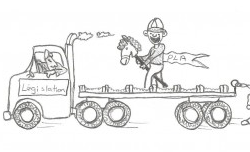The “Green” plastics industry can be very puzzling. When I first came to this industry, I felt great that I could be involved in something that’s good for the world. Save the world!
But then, one starts to question if the world even wants to be saved – bizarre. This industry includes bioplastics, composting, recyclers, oxo-degradables, PLA, Biodegradables, brand owners, manufacturers and of course our wonderful legislative leaders – each with differing perspectives and objectives. I’m fortunate to be involved with a company that provides multiple options, so I don’t have a single horse in this race. But I’m certainly happy not to be betting on a few of these ponies.
Nevertheless, there is no single technology available that can address all the problems or appease everyone, but there are solutions that do take a very responsible approach to the problem of plastic waste, depending on realistic methods of disposal. And this is where we run into a problem.
The recyclers do not want anything to contaminate the recycling stream. Understandable, it’s a viable industry, but the infrastructure is not capable of handling a significant enough percentage of the plastic output. I strongly support increasing our capacity to recycle. Yet, we have just as much, if not more, ability to harness landfill methane capturing (LFG) for clean, cheap energy. And due to the fact that the majority of this plastic is heading that way (landfill), we need to focus resources on supporting this effort. We can’t dismiss the greater value for the sake of a fledgling industry, it doesn’t make sense.
California (legislatures), you’re the mother ship for the quagmire that prevents innovation. California, for some very curious reason, supports solutions that are absolutely incapable of being a viable option for plastic waste. There are more practical options that address “plastic pollution” without compromising efforts to reuse. Limiting manufactures to one technology that supports only compost-ability, especially when this is such an inferior option in the big scheme of plastic usage and waste, is mind-boggling and counterproductive.
We have a raging river of plastic being produced every year, over 30 MILLLION TONS, the very large majority of this material is heading to a landfill – it needs to be managed. Many companies don’t want to get in the game, too much fluid legislation and regulation – shocker. Many adopt solutions that placate the cause of the day, despite their full knowledge that it is fundamentally flawed.
We need to get our heads out of our proverbial asses and start addressing the bigger problem, the larger percentages. There are amazing technologies out there, but there is no doubt that we are getting in our own way of making incredible progress. This is a young and rapidly evolving industry; the progress being made to address the fundamental problem we face is phenomenal. Instead of hindering ourselves with knee-jerk legislation and bans; perhaps we allow our ingrained ability to rise to the occasion with innovation. Technologies that have misrepresented their performance should not stand as the be-all to end-all to what we can achieve, it’s premature and shortsighted.
The question we need to ask ourselves is not who will win the race, but what race are we trying to win?

